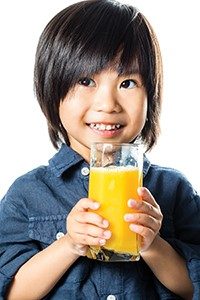American Academy of Pediatrics: No juice for babies, limited servings for children
 Citing its relationship with dental decay, among other health-related concerns, the American Academy of Pediatrics in May released a policy statement recommending no fruit juice for children under 1 year.
Citing its relationship with dental decay, among other health-related concerns, the American Academy of Pediatrics in May released a policy statement recommending no fruit juice for children under 1 year.
“We know that excessive fruit juice can lead to excessive weight gain and tooth decay,” said co-author of the statement Steven A. Abrams, M.D., in a news release.
The American Academy of Pediatrics recommendations say juice should not be introduced into the diet of infants before 12 months of age and that it should be given in limited amounts to children 1-18. The group also said, citing recommendations from the American Academy of Pediatric Dentistry, that toddlers should not be given juice at bedtime or from bottles or easily transportable, covered cups that allow them to consume juice easily throughout the day.
Dr. Valerie Peckosh, a pediatric dentist in Iowa and a member of the ADA Council on Advocacy for Access and Prevention, applauded the statement, calling it a “strong message that fruit juice is not a necessary or even a desirable part of a healthy diet for young children.”
“We still have a lot of parents who think fruit juice is a health food and that their children need it,” said Dr. Peckosh. “Dentists may want to familiarize themselves with the new statement so they can counsel families on the appropriate use of fruit juices.”
The ADA encourages dentists to stay abreast of the latest science-based nutrition recommendations and nutrition related screening, counseling and referral techniques. It also encourages collaborations with dietitians and other nutrition experts to raise interprofessional awareness about the relationship between diet, nutrition and oral health, according to an ADA House of Delegates resolution (Res. 60H-2016).
Dentists can refer patients to MouthHealthy.org, ADA’s consumer website, for up-to-date and evidenced-based information about nutrition.



